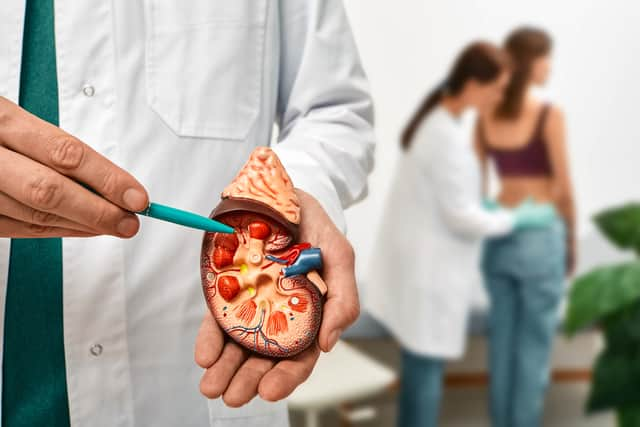What is chronic kidney disease? Signs, symptoms, treatment options and CKD stages explained
and live on Freeview channel 276
Chronic kidney disease (CKD) is a long-term condition where the kidneys don’t work as well as they should, the NHS said.
But what are the symptoms and stages of the disease?
Here’s what you need to know.
What is chronic kidney disease?
Chronic kidney disease is a common condition often associated with getting older.
Advertisement
Hide AdAdvertisement
Hide AdAlthough it can affect anyone, it’s more common in people who are black or of south Asian origin.
The condition can get worse over time and eventually the kidneys may stop working altogether, but this is uncommon.
Many people with CKD are able to live long lives, the NHS said.


What are the symptoms of CKD?
In the early stages, there are usually no symptoms of kidney disease.
Advertisement
Hide AdAdvertisement
Hide AdIt may only be diagnosed if you have a blood or urine test for another reason and the results show a possible problem with your kidneys.
At a more advanced stage, symptoms can include:
- tiredness
- swollen ankles, feet or hands
- shortness of breath
- feeling sick
- blood in your pee (urine)
What are the causes of CKD?
Chronic kidney disease is usually caused by other conditions that put a strain on the kidneys. Often, it’s the result of a combination of different problems.
CKD can be caused by:
- high blood pressure – over time, this can put strain on the small blood vessels in the kidneys and stop the kidneys working properly
- diabetes – too much glucose in your blood can damage the tiny filters in the kidneys
- high cholesterol – this can cause a build-up of fatty deposits in the blood vessels supplying your kidneys, which can make it harder for them to work properly
- kidney infections
- glomerulonephritis – kidney inflammation
- polycystic kidney disease – an inherited condition where growths called cysts develop in the kidneys
- blockages in the flow of urine – for example, from kidney stones that keep coming back, or an enlarged prostate
- long-term, regular use of certain medicines – such as lithium and non-steroidal anti-inflammatory drugs (NSAIDs)
The NHS said you can help prevent CKD by making healthy lifestyle changes and ensuring any underlying conditions you have are well controlled.
When should I see a GP?
You should see a GP if you have persistent or worrying symptoms that you think could be caused by kidney disease.
What are the tests for CKD?
Advertisement
Hide AdAdvertisement
Hide AdCKD can be diagnosed using blood and urine tests, which look for high levels of certain substances in your blood and urine that are signs your kidneys aren’t working properly.
If you’re at a high risk of developing kidney disease you may be advised to have regular tests to check for CKD so it’s found at an early stage.
The results of your blood and urine tests can also be used to tell the stage of your kidney disease.
This is a number that reflects how severe the damage to your kidneys is, with a higher number indicating more serious CKD.
What are the stages of CKD?
Advertisement
Hide AdAdvertisement
Hide AdYour test results can be used to determine how damaged your kidneys are, known as the stage of CKD.
This can help your doctor decide the best treatment for you and how often you should have tests to monitor your condition.
Your eGFR (estimated glomerular filtration rate) is a measure of how well your kidneys are working and results are given as a stage from 1 of 5:
- stage 1 (G1) – a normal eGFR above 90ml/min, but other tests have detected signs of kidney damage
- stage 2 (G2) – a slightly reduced eGFR of 60 to 89ml/min, with other signs of kidney damage
- stage 3a (G3a) – an eGFR of 45 to 59ml/min
- stage 3b (G3b) – an eGFR of 30 to 44ml/min
- stage 4 (G4) – an eGFR of 15 to 29ml/min
- stage 5 (G5) – an eGFR below 15ml/min, meaning the kidneys have lost almost all of their function
Your ACR (urine albumin to creatinine ratio) test helps identify kidney disease that can occur as a complication of diabetes and results are given as a stage from 1 to 3:
- A1 – an ACR of less than 3mg/mmol
- A2 – an ACR of 3 to 30mg/mmol
- A3 – an ACR of more than 30mg/mmol
Advertisement
Hide AdAdvertisement
Hide AdFor both eGFR and ACR, a higher stage indicates more severe kidney disease.
What are the treatment options for CKD?
Although there’s no cure for CKD, treatment can help relieve the symptoms and stop it getting worse.
Your treatment will depend on how severe your condition is, but the main treatments are:
- lifestyle changes to help you remain as healthy as possible
- medicine to control associated problems such as high blood pressure and high cholesterol
- dialysis – treatment to replicate some of the kidney’s functions; this may be necessary in advanced CKD
- kidney transplant – this may also be necessary in advanced CKD
You will also be advised to have regular check-ups to monitor your condition.
Comment Guidelines
National World encourages reader discussion on our stories. User feedback, insights and back-and-forth exchanges add a rich layer of context to reporting. Please review our Community Guidelines before commenting.
